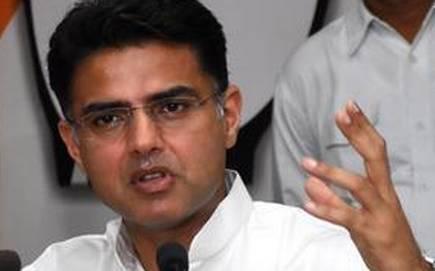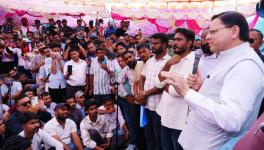Congress Strategy on Pilot is Fine, but it Needs to Stop Drifting

Image Courtesy: The Hindu Business Line
It has been a few days since the crisis over the Rajasthan government blew in. And now it appears the matter will be decided in the courts. For all the sense of the inevitable, the outcome is far from being sewn up by the Bharatiya Janata Party (BJP).
Sachin Pilot, the deputy chief minister in the Congress government of Rajasthan, fired several rounds against the bows at his party on 12 June, issuing, for good measure, a statement saying the government run by Chief Minister Ashok Gehlot no longer had a majority. In due course, it appeared that Pilot had hunkered down in Haryana, with a number of his “loyalists”.
The question of how many loyalists is crucial. At the outset, the numbers suggested were between 20 and 30. As the days wore on and wore down the dimensions of the crisis, they seemed to have whittled down the numbers to around 20, including Pilot. From his Haryana redoubt, Pilot has made any number of statements. We are picking two: first, that he wants Gehlot to go as chief minister as a precondition for “peace”; two, cross his heart, he has no intention to join the BJP.
On 13 June, Pilot made his position clear when he refused to attend, with “his” MLAs, a Congress legislature party (CLP) meeting for which a whip had been issued.
The Rubicon having been crossed, the empire struck. On 14 June, the party removed Pilot from the post of deputy chief minister and head of the Pradesh Congress Committee; and, four of his “loyalists” were removed from the Rajasthan ministry. The next day, Rajasthan Assembly Speaker CP Joshi sent anti-defection notices to Pilot and 18 other MLAs. On 19 June, Pilot and the 18 other MLAs filed petitions against certain proceedings at the Rajasthan High Court. The hearing is posted for 23 July.
Several questions need to be asked for us to make sense of what is happening. Why did Pilot suddenly pull the plug? What does he want? Why is Rajasthan Chief Minister Ashok Gehlot not trying to resolve the problem? Why is he not being conciliatory enough? What is the “high command” doing? Why has it not got the two antagonists to sit across a table?
The whole thing is simple. It is Gehlot who has the backing of the “high command”, not Pilot, despite the former deputy chief minister’s presence and capacity to put in hard work, which he had adequately demonstrated over many months in the run-up to the 2018 assembly elections. And his perceived proximity to Rahul Gandhi.
Once we have nailed this down, we can only see Pilot’s “rebellion” as a misadventure undertaken at the instigation of the BJP, which must have made the kind of offers it routinely makes to unseat governments. One would have thought that Pilot had got a pretty good deal compared to say Jyotiraditya Scindia, who got nothing and was kept in limbo in respect of a state Cabinet position, the post of chief of the state party, or a central role.
It may have stopped seeming enough when Pilot saw Scindia twist enough arms to get a very sweet deal in Madhya Pradesh. Essentially, Pilot has taken a punt. One that does not appear very astute, given his circumstances. Which brings the BJP into the picture. The party disclaims any authorship of the crisis. You’d have to have just landed from a very distant planet to believe that.
A possible sequence is that BJP agents provocateurs started approaching Pilot after the success of the Madhya Pradesh operation. It is possible that Pilot got tempted because Scindia had got a good deal and because his situation vis-à-vis Gehlot was not looking like it would improve. The question is: is Pilot really riding the tiger or playing at getting a better deal? The latter is not likely given the escalation of rhetoric and action on both sides.
So, how about the wise heads in Delhi and the Gandhi siblings. For the record, they both spoke to Pilot, but neither, especially Rahul, seems to have made a special effort to persuade Pilot to abandon his plans. A multiplicity of senior leaders have spoken to Pilot and asked him to stay his hand. No dice, says Pilot.
In other words, from the moment Pilot made his gambit, the chances were always high he would be isolated. He had already got a lot, so all he could bargain for was Gehlot’s removal and his own anointment as chief minister. This sounds strange. Everyone knows that apart from being a three-time chief minister (including this term), Gehlot has a lot of clout within the high command. In fact, Pilot must be well aware that his adversary is one of the key pillars of the high command. That, of course, helps us to understand everything from the party standpoint: the sympathy from younger leaders, but not support; the phone calls from the Gandhi siblings, but no offers; and the speed with which the party moved against him and his fellow “rebels”.
It remains to be understood what made Pilot take this step. It could be he wanted to be chief minister. That is hardly a good reason to leave your party. Pilot is in his early forties, with plenty of time to get the top job. It could be he was feeling hemmed in by Gehlot and realised that as long as the chief minister was his boss, he would not have any substantial power. Pilot has suggested that on a number of occasions—during the crisis and before. It does not sound like “raising the standard of rebellion” is a very genius-level strategy to sort that problem out. Surely he could have aired his grievances within official channels for redress.
Which brings us to the possibility that he did, found no takers and decided to quit the party whatever happened. Emissaries met at the dead of night and exchanged small pieces of papers and a deal was stuck. If this is the right reading, Pilot will either soon be in the BJP with adequate compensations, or, true to his protestations, start his own party. Now, we all know how much traction one-horse parties have in Indian politics. So, he will look for his rewards from another party. And that, sure as hell, will not be the Congress
In all this, the Congress “high command” has acquitted itself perfectly. It had its priorities and it stood by them. Thus, when Pilot sneaked up on them making really meaningless demands, they basically told him he was free to leave the party.
Will this hurt the party? Obviously, yes. Pilot was an exceptionally able leader, with organisational and ministerial experience, a capacity for work and a reasonably clean image. But the harm will not be irreparable because of the answer to the next question. Will this help the party in any way? Probably, because it gestures to others (young or old) that holding a gun to the party’s temples is not a guarantee that any demand, however extortionate, will be met.
The Congress must, however, be careful and somewhat energetic. It has to bring an end to this extended period of drift and elect—yes, properly elect—a new president, who will simultaneously have to begin the process of rebuilding the party and sorting out its political direction.
That is crucial because events of recent vintage have demonstrated that the leviathan in the room is neither omnipotent nor indestructible.
Get the latest reports & analysis with people's perspective on Protests, movements & deep analytical videos, discussions of the current affairs in your Telegram app. Subscribe to NewsClick's Telegram channel & get Real-Time updates on stories, as they get published on our website.
























